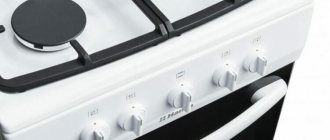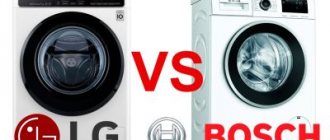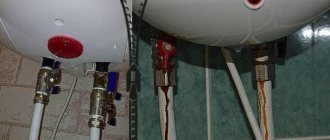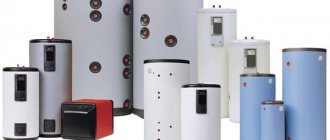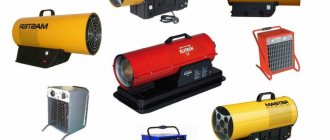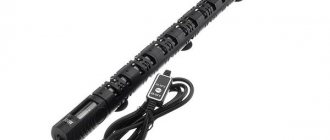Every year, installing an individual source of hot water supply in private houses and apartments is becoming more and more important. The era of centralized hot water supply is gradually becoming a thing of the past, because sometimes it may be more profitable to have your own water heater. This allows you to control utility costs and save money at your own discretion. The only question is: what equipment to choose for heating water? The purpose of the article is to give a detailed answer to this question, to determine which is better - a gas water heater or a boiler, revealing all the pros and cons of various water heating units.
Types of household appliances for DHW needs
At the moment, there are 2 types of water heaters that differ in operating principles: instantaneous and storage. Both use two energy sources: natural gas and electricity. Let's collect them all in one list:
- geysers for water;
- electric storage water heaters (boilers);
- gas storage heaters;
- electrical flow installations.
The first 2 types of water heating devices are the most popular; they constantly compete with each other, despite the difference in the energy carriers used. Geysers are devices that directly heat running water in a heat exchanger with a burner flame. Hot water is supplied almost instantly, you just need to open the tap.
Electric boilers work differently: a tank filled with cold water is gradually heated by built-in heating elements. It makes sense to turn on hot water when the container has heated up to at least a temperature of 40 ºС, which will take 2-3 hours. If the temperature has reached the set temperature, but there is no water supply, the device maintains it at a certain level, turning the heating elements on and off.
Less commonly, storage gas heaters are used to supply hot water. This product appeared on our market relatively recently and has not yet gained much popularity. A household gas boiler is a kind of hybrid between a gas water heater and an electric boiler. From the latter he took the principle of operation, and from the column - a method of heating water and natural gas as a source of thermal energy.
And finally, instantaneous electric heaters operating on the principle of a gas water heater, only using electricity instead of natural gas. For this reason they got their name - electric speakers.
Despite the fact that they appeared on the market a long time ago, to this day they are truly exotic, as they are very rarely found in private homes. The reason lies in the device’s electrical power being too high; not every home has such power. Therefore, we can consider these heaters only for informational purposes. Now, to make a comparison, we will analyze each type of equipment separately.
Gas water heaters: pros and cons
The biggest and main advantage of units of this type is the ability to provide the house with hot water for an unlimited time. The burner of the device begins to heat the water almost immediately after opening the tap and will do this until the valve closes. This feature of geysers makes them the undoubted leader among all units in terms of comfort.
The only condition: the thermal power of the burner must be enough for all consumers. Modern turbocharged units are equipped with electronic combustion intensity control systems, as a result of which changes in water pressure have virtually no effect on its final temperature. But if the thermal power of the gas water heater is initially selected incorrectly, then at high flow rates barely warm water will flow from all the mixers.
An important advantage of gas instantaneous heaters is their small dimensions, allowing the device to be squeezed into the smallest kitchen. This is why speakers are so popular among residents of small apartments. In addition, the product is quite reliable (if you do not take into account Chinese products) and repairable. Due to the fact that water supply networks in the post-Soviet space leave much to be desired, the gas water heater periodically requires maintenance and cleaning.
Now about the disadvantages:
- Installation of gas-using equipment is a troublesome task and requires investment. You need to complete the project, get it approved, and then install and connect the heater, which only a licensed organization has the right to do;
- any gas water heater requires a chimney and supply and exhaust ventilation for its operation;
- for stable operation of the device you need a certain pressure of water and gas;
- In terms of efficiency, the column is inferior to a boiler; its efficiency is a maximum of 92% versus 98-99% for electrical appliances.
Another delicate moment. In many cities, the inlet water temperature is very low in winter. A gas flow-through installation, even the most powerful, is not able to heat such water to normal temperature at normal flow rates. That is, when operating at maximum, the column will not produce the promised 10 l/min of hot water, but only 5.
Review of the best models
The best geyser for a home or apartment is a device that meets the user’s requirements, performs its assigned function - to heat water, economically consuming fuel. A review of popular models presents a rating of the reliability and quality of devices from different manufacturers. Allowing you to choose the right unit.
Bosch WR 10-2P23
The average cost is 11,000 rubles.
The Bosh WR 10-2P23 heater is necessary if the DHW problem is urgent. The device is reliable and easy to install.
A power of 10 liters per minute is enough to supply water to consumers in the bathroom and kitchen at the same time. Placed on the wall, it does not cause any difficulties with installation or connection. Powered by natural and liquefied gas.
Semi-automatic, ignites by pressing a button. Owners note the absence of noise during operation.
The device is safe to use. If there is a failure in the air or gas supply, it turns off automatically.
Bosch WR 10-2P23
Advantages
- safety;
- semi-automatic operation;
- performance;
- work without noise;
- compact sizes.
Flaws
- no light indication;
- no thermometer;
- the wick periodically goes out;
- expensive spare parts.
Zanussi GWH 10 Fonte Glass
The average cost is 7,000 rubles.
The Zanussi GWH 10 Fonte Glass geyser attracts attention with its design. Views of a metropolis or hot resorts under glass on the outside of the case lift the spirits of others, becoming an attractive element of decor. Mounted on the wall in the water supply circuit.
The model runs only on natural gas. Equipped with mechanical control knobs. Using the switch, the desired temperature and power values are set. And the electronic display will display the current values.
Electronic ignition. The noise level is minimal.
Security issues are thought out to the smallest detail. The light indication indicates the operation of the device and the heating process. Disconnection from the network in the event of dangerous situations increases safety and stability of operation.
Zanussi GWH 10 Fonte Glass
Advantages
- design;
- electronic ignition;
- not complicated controls;
- indicator lights;
- safety;
- budget cost.
Flaws
- do not indicate.
Neva 4510T
The average cost is 11,000 rubles.
The Neva 4510T heater is ideal for a private home or cottage. A turbocharged device is installed anywhere in the room where the water supply circuit is close. Focused on natural gas. Devices for liquefied fuel are present in the line with special modifications.
Burner type – closed. Harmful impurities are removed directly to the street, eliminating the appearance of odors in the room. The device sucks in air from the external environment for ignition. The burner is electric; no battery power is required.
The model stands out for its laconic design. Rotary controls are located on the front panel.
The Russian development demonstrates safety at the highest level. Protection against overheating and freezing, voltage supply stabilization, blocking in case of failures.
Neva 4510T
Advantages
- reliability;
- safety;
- closed burner;
- quiet operation;
- performance;
- combustion products are discharged to the street.
You will be interested in: TOP 10 best dishwasher tablets: rating, which ones to choose and buy, characteristics, reviews, pros and cons
Disadvantages
- not found.
BaltGaz Comfort 15
The average cost is 12,000 rubles.
The flow-through heater BaltGaz Comfort 15 is manufactured in Russia and is aimed at the local market. Accessories and spare parts are available at reasonable prices.
The unit is designed for use in homes and offices with strong pressure. Capacity 15 liters per minute. Two water intake points allow the device to be used for several consumers.
The burner is automatic. Requires two batteries to operate. The display on the panel displays the charge percentage. This facilitates operation and timely replacement of used parts.
BaltGaz Comfort 15 is characterized by stable operation even in emergency situations. Thanks to the mechanical regulation of the flame, differences in the water supply are reduced to a minimum.
BaltGaz Comfort 15
Advantages
- safety;
- work on natural and liquefied gas;
- compactness;
- stable heating;
- environmental friendliness of the burner;
- screen displaying temperature and battery charge.
- availability of components.
Flaws
- case quality;
- tough regulators.
Beretta Idrabagno Aqua 11
The average cost is 16,500 rubles.
The Beretta Idrabagno Aqua 11 geyser is made in Italy. Users note the simple design, quality of the case and parts.
Productivity is 11 liters per minute. The device operates even at low gas or water pressure. Ideal for use in homes where such situations periodically arise.
The temperature reaches 60 degrees. The degree of heating is controlled by switches at the bottom of the case.
To connect the kitchen and bathroom at the same time, there is not enough power and nozzles, as users note.
Beretta Idrabagno Aqua 11
Advantages
- durable body;
- electronic ignition;
- automatic shutdown in the absence of traction;
- pressure stabilization;
- easy control.
Flaws
- expensive components;
- loud sound when igniting;
- difficulties with service in Russia.
Bosch WRD 13-2G
The average cost is 19,000 rubles.
The WRD 13-2G turbine device from the German manufacturer Bosh eliminates the need to use matches and batteries for ignition. The work is based on the water pressure on the hydrogenerator. The technology is called HydroPower. This system improves the environmental performance of the device.
The unit is controlled mechanically. The controls on the front panel help you set the temperature and heating power. The device has a high capacity of 13 liters per minute. Used for 2 consumers.
The steel body and copper heat exchanger increase reliability and service life. According to the manufacturer, the service life is 15 years.
Bosch WRD 13-2G
Advantages
- copper heat exchanger;
- turbine hydrogenerator;
- electronic screen;
- temperature up to 60 degrees;
- non-volatile device;
- high performance.
Flaws
- non-standard pipe size for waste gases;
- turbine sound when turned on;
- does not work on small streams of water;
- complexity of installation.
Gorenje GWH 10 NNBW
The average cost is 8900 rubles.
The Gorenje GWH 10 NNBW flow-type heater is securely mounted on the wall. Thanks to its laconic appearance, it fits into the interior of a kitchen or bathroom. The steel body is easy to use.
The device runs on natural gas only. Provides heating even with low water supply. During interruptions in the supply of blue fuel, it is automatically switched off.
The power of 10 liters per minute is enough to satisfy the needs of users in the bathroom and kitchen.
The temperature reaches 75 degrees. Current parameters are displayed on the display and adjusted by mechanical switches.
Gorenje GWH 10 NNBW
Advantages
- works quietly;
- electronic ignition;
- high-quality assembly;
- electronic display;
- not difficult installation;
- compact body.
Flaws
- does not maintain the set temperature well.
Electrolux GWH 11 PRO Inverter
The average cost is 15,900 rubles.
The Electrolux GWH 11 PRO Inverter geyser operates in automatic mode. The flame modulation system stabilizes operation during water supply failures. Natural gas is used as fuel.
You will be interested in: Rating of the TOP 10 best home theaters: which one to choose and buy, reviews, price, characteristics, pros and cons
Equipped with an 11 liter tank. High performance fully satisfies the demand for domestic hot water. The temperature reaches 70 degrees.
An LED display that displays the current parameters and controls add comfort during operation.
Light indicators, overheating protection, and self-diagnosis modes make the device safe.
Electrolux GWH 11 PRO Inverter
Advantages
- LED display;
- 11 liter tank;
- smooth regulators;
- self-diagnosis of errors;
- automatic heating control;
- performance.
Flaws
- long heating time;
- build quality.
Ariston Fast Evo 14C
The average cost is 19,000 rubles.
Stylish appearance and maximum operating comfort distinguish the Ariston Fast Evo 14C. The design of the case was created in Italy, the internal part was thought out by engineers to the smallest detail. Hot water is available at any time of the day. A capacity of 14 liters per minute is enough for those who like to soak in the shower.
The column does not depend on the electrical network; it ignites under pressure. The required heating parameters are set once. Afterwards the system adjusts itself. Interruptions in the supply of water or gas do not cause problems with the operation of the unit.
The device is equipped with the necessary sensors that will promptly signal the occurrence of problems, stabilizing or blocking the process.
Ariston Fast Evo 14C
Advantages
- design;
- automatic control;
- gas control;
- overheat protection.
Flaws
- installation difficulties;
- does not display the current water temperature.
Baxi SIG-2 11i
The average cost is 12,000 rubles.
The Italian-made Baxi SIG-2 11i speaker has received positive reviews from owners for the quality of the materials from which it is made. The device is designed to work with natural gas. The presence of a gearbox in the factory configuration requires reconfiguring the system for liquefied fuel.
The capacity is calculated for one consumer and is 10.9 liters per minute. Most often used in the bathroom.
Built-in water filters clean the incoming liquid from impurities, extending the life of the device. Gas leak analyzers signal problems.
Baxi SIG-2 11i
Advantages
- case quality;
- display;
- display of current temperature;
- gas control;
- water filter;
- flame modulation.
Flaws
- the case heats up;
- noise during operation.
Advantages and disadvantages of an electric boiler
The storage electric water heater has many advantages, which determines its high popularity:
- simple installation that does not require approvals or the involvement of specialized organizations;
- no chimney or ventilation required;
- independence from pressure in the water supply network and its temperature;
- high efficiency (efficiency up to 99%);
- the ability to simultaneously provide a large flow of hot water;
- The heating elements of a modern boiler do not come into direct contact with water and are not covered with scale.
The two main disadvantages of the unit are the limited volume of water dispensed and the need to wait for the next portion to heat up for several hours (from 1.5 to 5). An incorrectly selected tank capacity will lead to the same consequences as an incorrectly selected power column - cold water will run out of the tap.
The volume of space occupied by the boiler is quite significant compared to a gas flow-through apparatus. And, although there are tanks with a flat configuration, for an ordinary family of 3-4 people you will need a capacity of at least 80 liters, which is a significant disadvantage in an apartment. Because of this, the boiler in small bathrooms is suspended above the bathtub, often hitting the head against it.
Winner selection
Before resolving the dispute - boiler or water heater, let's say a few words about storage gas heaters. They are promising because heating of the entire volume of water in the tank occurs twice as fast as that of its electric “brother.” It is also independent of water pressure and is able to immediately provide high flow rates for domestic hot water. The disadvantages are inherited from the column: the need for permits, the complexity of installation and the need for a chimney and ventilation.
The question - which is better to choose - is not worth it at all when there is no gas supply in the house or an insufficient electricity limit; we consider the situation from other points of view. So, in the “ease of use” category, the gas water heater definitely wins; it allows you to get what you want almost immediately. On the other hand, installation of gas-using equipment will cost a pretty penny. Because installing a boiler will cost less and will be completed much earlier, it wins in the “cost and speed of installation” category.
Which heater will win in the “economical operation” category depends on the location of the user. It is clear that it will be more profitable for Russians to use natural gas, because in the Russian Federation it is much cheaper than electricity and the boiler will always be an outsider. But residents of Ukraine and Belarus have something to think about, for example, a multi-tariff electricity meter. Thanks to him, the storage heater can be in first place.
In the “reliability and service” category, friendship wins. Moreover, with tap water, rich in salts and impurities, which equally successfully attack the magnesium anode of the boiler and the water unit with the heat exchanger of the gas water heater. The anode “lives” from 2 to 5 years, during which time scale grows in the heat exchanger and rubber seals dry out, so the question of which is more economical to maintain remains open.
Tips for choosing
Buying a good gas heater is a difficult task for a person who does not understand the important parameters of the device. Tips to help you choose a device:
- Power. The amount of hot water depends on the output. When connecting to two consumers, an indicator of 20-35 kW is required.
- Ignition type. Models with a hydrogenerator are reliable and provide stable operation at high pressure. Electronic ignition is convenient if the column is equipped with a sensor that monitors the battery charge level. Users of units with a piezo igniter complain about the button sticking and the need to use matches.
- Gas combustion chamber. Closed burners are more environmentally friendly than open ones. Impurities do not linger indoors and are transported outside. The air to maintain the fire comes from the external environment, and not from the room.
- Flame modulation is effective when the pressure is not uniform. The function prevents the device from overheating.
- Gas analyzer, indicators. Sensors that notify with sound and light signals about problems, gas leaks, increase the safety of the device. The presence of a shutdown function guarantees stability in the event of a failure.
- Display. Displaying the current temperature, battery level and other parameters on the screen allows the user to evaluate the functionality.
You may be interested in: TOP 8 best irons: travel, cordless, with a steam generator

